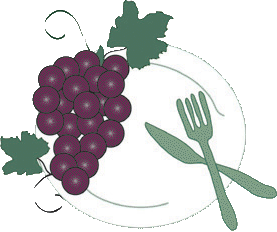
An article in this morning's Wall Street Journal purports to rank the best and worst jobs in the United States "according to five criteria inherent to every job: environment, income, employment outlook, physical demands and stress." Best job, says the WSJ: mathematician. Worst: lumberjack. Conclusion: heavy lifting, never popular, remains out of fashion. The ideal jobs expect you to dress reasonably well, let you work close to home and take regular showers.
So why isn't food critic on the list? Okay, maybe it's not in the top ten, but it should be. Benefits include decent meals (much of the time), work-from-home environment while listening to preferred genre of music (usually classical), occasional travel to popular destinations. Acknowledged drawbacks: irregular hours, irregular digestion (when meals less-than-decent), irregular paychecks.
Seriously, though: greatest job benefit is the soapbox. Not just steering people to good restaurants and away from bad ones, but highlighting issues related to food, wine, travel. Case in point: today's New York Times Op-Ed by farmer and essayist Wendell Berry, who argues that the real energy crisis won't be running out of non-renewable petroleum but non-renewable soil. Much more serious, since we don't have alternatives (solar, wind) to food-producing soil. Berry writes, "If we continue our offenses against the land and the labor by which we are fed, the food supply will decline, and we will have a problem far more complex than the failure of our paper economy." The answer, perennialization, is a mouthful, as it were, but basically "crop rotations that include hay, pasture and grazing animals."
Berry calls for a 50-year farm bill to reduce our dependency on soil-destroying industrial agriculture, arguing that money alone cannot continue to feed us. And without food, what's going to become of my great job?
(Footnote: Guy named Ronald Holden is reporting $25K in contributions to McCain campaign. Is not me.)

The International Kitchen
Cooking school vacations in Italy, France & Spain.


 Who links to me?
Who links to me?
Ronald,
As you know, I grew up on a dairy farm where we raised our own food to feed 9 family members. Believe me the land on which we grew our food was sacred; enriched only with
organic cow fertilizer.
I have noticed that the richest land for raising food is most often found at the confluens of rivers or rivers with oceans, etc. That's where cities were established. However, the land was taken away from farming and covered over with parking lots and bldgs. One case in point is SouthCenter which used to be replete with "truck farms",farm land and duck hunting habitat. But, no longer. I am told that valley has many feet of high grade soil; only now it suffocates under concrete and macadam. Regrettably, now most of our marginal food comes from marginal soil supercharged with chemical fertilizers. Have we forgotten that we are what we eat? Dr Joe